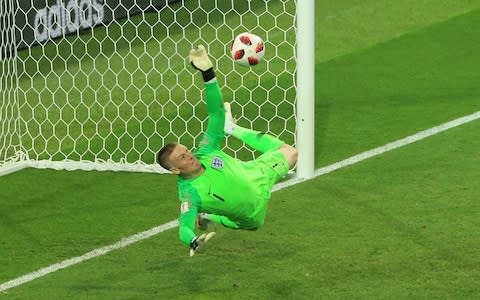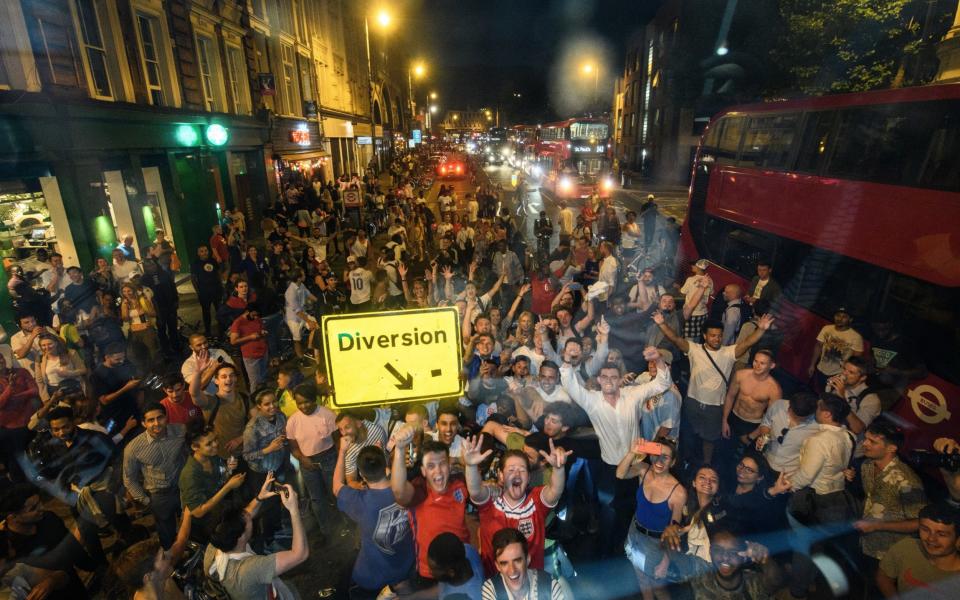How this World Cup made England fall back in love with football
England has become gripped by two strange and mysterious feelings: an uncomplicated love for its football team, and something like optimism about doing well in a World Cup.
From beery fan parks to little kids coming to the England team with a clean slate, and even those scarred by León 1970, Mexico City 1986, Turin 1990, Saint-Étienne 1998 and Bloemfontein 2010, something is happening with England and football at this World Cup.
Perhaps it will come crashing to a grim halt on Saturday, mowed down by a boxy Swedish Volvo, and perhaps it continue into the gilded realms of a semi-final... or beyond.
READ MORE: Sweden will stick to strengths against England
READ MORE: England similar to Spain’s 2010 World Cup winner - Garcia
READ MORE: Revealed - Jordan Pickford’s secret water bottle helped beat Colombia
But whatever happens from here, we can at least say that we have been involved, engaged and inspired. But how?
Firstly, there have been some highly enjoyable matches at this World Cup, and the viewing figures for non-England matches have been nothing short of remarkable. 12.4 million people watched Belgium play Japan on BBC1, with another two million online.
Gary Lineker succinctly described this as “mental”.
Good heavens! 12.4 million of you watched on @BBCOne and 2m stream requests for Belgium v Japan last night. Mental numbers for non England games.
— Gary Lineker (@GaryLineker) July 3, 2018
Meanwhile, the numbers for England’s matches have been mental, physical and emotional. England’s match with Colombia on ITV had a peak of 24.4million: this is national conversation territory, this is Morecambe and Wise. Not bad going for a medium in supposed decline.
England’s games, strictly speaking, have not necessarily produced football of high quality, but they have had the advantage of pitting our brave lads against teams only a mother could love. Panama were a bunch of incompetent cheats, Colombia were a mob of highly skilled cheats.

When not colonising your country, enslaving or invading you, the English have a firm sense of fair play. The sight of honest, likeable and guileless John Bulls like our various Harrys being manhandled and kicked by dastardly Carlos Kickaballs is exactly the sort of self-image of Albion’s Goodies vs Foreign Baddies that most of the English can access without too much difficulty, or three drinks.
Last night I photographed residents of the Kirby Estate as they watched #ENGCOL. The media made out the Colombian family who live there wouldn't be welcome. This couldn't have been any further from the truth. A great community. This has been my favourite World Cup moment so far. pic.twitter.com/C6DVOx0XxA
— Charlotte Wilson (@wilsonscribbles) July 4, 2018
The introduction of Video Assistant Refereeing has been another driver, giving the English something else to rail against: faceless bureaucracy, capricious and mysterious legal processes taking place behind closed doors, foreigners in their silly little uniforms getting too big for their boots. Meddling Europrats, in short. It has a dimension of drama, and hilarity, always with the galvanising sense of a possible great injustice being done to our boys.
The national mood has been so swayed by the tournament that politicians have of course been trying to stick their oar in, and of course it has been awful. Theresa May, her cement mixer touch as leaden as ever, found her office asked “does the Prime Minister think it’s coming home?” A Number Ten spokesperson: “She hasn’t specifically used that form of words, but she’s very pleased.” Exterminate! Penalty kick! Exterminate!
Does the prime minister think it’s coming home?
No 10 spokesperson tells me: “She hasn’t specifically used that form of words, but she’s very pleased.”
— Benjamin Kentish (@BenKentish) July 4, 2018
If David Cameron ever returns to anything like tolerability after his own smash-and-scarper national howler, it will be a recovery of Southgatian bouncebackability. He seized the moment for a possible rehabilitation twittering: “Last night I enjoyed a real father and son moment: first, calmly explaining that England and penalty shootouts don't go together, and then the sheer joy, delight and exhilaration at an England victory! Well done #ThreeLions Onwards...!”
Last night I enjoyed a real father and son moment: first, calmly explaining that England and penalty shootouts don't go together, and then the sheer joy, delight and exhilaration at an @England victory! Well done #ThreeLions Onwards...!
— David Cameron (@David_Cameron) July 4, 2018
Jeremy Corbyn wants a holiday.
There's a long way to go, but if England win the #WorldCup the Government should declare a public holiday as a day of national celebration.https://t.co/Q5Wfoh8jpO
— Jeremy Corbyn (@jeremycorbyn) July 4, 2018
But what of those on foreign field? How have they contributed to this World Cup glow? It has helped that there has been no beastly behaviour by England fans abroad. Our hooligans, once considered world class, have been more than happy to bully Dutch bicycles or French waiters but found the thought of Russia’s bigger boys, and frightening state apparatus, an altogether different proposition. There is no question that it is easier to like a football team when its most visible fans are not destroying the town square a mile from the stadium. There hasn’t even been enough of them to drown out the opponents’ anthems with boos.

The tournament itself, watching on TV at least, looks well organised, peaceful and safe. If there has been a sense of the Potemkin Village about the friendly, fun, all-pals-here Russia of the World Cup, most people seem more than happy to play along.

And is this fun footballing festival being passed on to a new generation? Anecdotally, it certainly seems so.
One primary school deputy head said on Wednesday: “A big part of the job is safeguarding, child-protection and that only comes through talking to the children. But that is not always easy with very withdrawn kids. The football has been a great way to check in with how the kids are, particularly quiet kids who never normally talk. Because of the football I have had conversations today with five different children who never usually engage.”
READ MORE: Sweden pile the pressure on ‘spoilt’ England
READ MORE: Henderson admits he’ll be forever in Pickford’s debt
READ MORE: Sweden warn England they’re in for a battle
It must be said that football is far from a universal positive force in the home, though. Lancaster University, working with data from Lancashire Police from the 2002, 2006 and 2010 tournaments found that:
“After controlling for day of the week, incidents of domestic abuse rose by 38 per cent in Lancashire when the England team played and lost and increased by 26 per cent when the England national team played and won or drew compared with days when there was no England match.”

Those of us who have seen one too many mornings with football should not buy into the idea of it as a pure force for good just yet. But part of the pleasure of the World Cup delight has been that it snuck up on us all. There was little hype around the England team, a sense of affable pessimism perhaps, rather than the overconfidence in some previous editions.
The Telegraph.co.uk website allows boffins and eggheads to track exactly which stories people are reading, and for how long, and various other “engagement” metrics: people were unusually unmoved by the World Cup right until the start of the tournament and then, well, World Cup fever broke out, and it is a seriously virulent strain. The numbers of people reading are vast.
On the subject of the media, it is perhaps worth noting that any cause needs a common enemy. In previous summers, this has often been the team, or some elements within it, or the manager. This year, for many, it has been the press, which has been collectively charged with undermining the team, picking on Raheem Sterling, and effectively committing something like treason for printing the teamsheet.
Tomorrow's front page: Raheem Sterling has triggered the fury of anti-gun campaginers by unveiling his new tattoo of an M16 assault rifle. pic.twitter.com/LdHfi6j3em
— The Sun (@TheSun) May 28, 2018
With society’s liberal pillars – such as a free press, or a judiciary being protected from party political interference, or an independent second chamber – starting to be openly chipped at by elite and populace alike, and an appetite for strong-man authoritarianism in the water, it has been interesting to note that a lot of people seem to think the job of the press is to be a loyal booster for a publicly funded body such as the national football team.
As to the other factors, of course there is that most English of preoccupations: the weather. All over the country this has been one of the top five warmest Junes since records began in 1910. The average UK temperature has been the same as the famous summer of 1976, and second only to 1940.
Best dressed manager in the World Cup? This might be us being biased but we think so �� (seen here in the M&S suit). Good luck to the @England team who tonight take on Belgium for the last game of the group stage https://t.co/yelA8r1vRspic.twitter.com/DiVfel17QM
— M&S (@marksandspencer) June 28, 2018
Despite these sweltering conditions, lovely man Gareth Southgate has single-breastedly boosted Marks and Sparks waistcoat sales by 35% this week.
Wondering how long this warm and sunny weather will last? ��
The jet stream will remain to the north of the UK, keeping any weather fronts at bay
This will maintain high pressure throughout the next two weeks, bringing plenty more very warm sunshine ☀️☀️☀️☀️#heatwavepic.twitter.com/MuZOQCYWqr
— Met Office (@metoffice) July 2, 2018
Whatever the team does from this point, whoever is doing the player handling and PR at the FA should put in for a payrise. It is now held as a matter of fact that the current squad are a great bunch of lads, an entirely different breed from the aloof, grasping frauds of previous tournaments.
Dad, can you show me that photo of you guys running after reaching the quarter final?
-“Nah son pic.twitter.com/WbY5StQRLQ
— Kyle Walker (@kylewalker2) July 3, 2018
This does seem unfair to their predecessors: your Frank Lampards, your Rio Ferdinands, your John Terrys (perhaps not him) and many others who tried their level best, but whatever else they had or didn’t have, the did not have the social media magic dust that Kyle Walker or Jesse Lingard are sprinkling about the place. To be able to connect directly with supporters and have them like you makes a huge difference: fans, particularly younger ones, feel that they have a relationship with these guys in a way that seemed gone forever after the wage explosion in the domestic game.
No mum, I’m not coming home. It’s... pic.twitter.com/VdFHVoEfTI
— Jesse Lingard (@JesseLingard) July 3, 2018
Kick off times have certainly helped those with junior England fans on their hands: 7pm being late enough for people to get back from work but early enough so that those with children can let them watch some or all of it without too much meltdown potential. And the outcome seems to be a new generation of football fans. Thomas, seven, and Arthur, six, from Harringey like arguing about who is better out of Messi and Ronaldo, filling in their England wallchart, and following the numbers. “Harry Kane has six goals,” they note authoritatively. This is their first World Cup experience, and they like it.

Iris, 10, from Walthamstow (her primary school is just up the road from Harry Kane’s) is a veteran of two tournaments, but this is the one that has captured her.
“I remember Brazil (2014) because people from Brazil love football but this World Cup is more exciting because England are doing well. I wrote a song about the World Cup, it’s about a football that flies of the pitch but then it gets punctured.”
Unlike the serenaded ball, hopes post Colombia remain buoyant.
“I stayed up until 10pm to watch England and I was very nervous. Some people in our class were not allowed to stay up but they could hear their parents watching it and shouting so they knew what was happening,” said Iris.
“I think England have a chance to win the World Cup. Well, a small chance. And I think they are really good at penalties.”
On the evidence available to her, what other conclusion could Iris draw?

